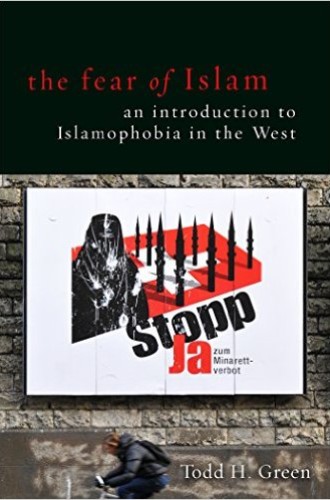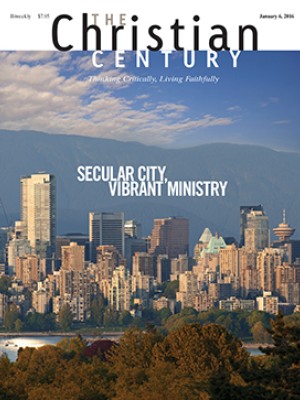The Fear of Islam, by Todd H. Green
Virtually every day, headlines and reports present images and narratives that link Muslims and Islam with violence, often arousing attitudes of fear and distrust not only toward the perpetrators of the misdeeds but toward all Muslims and toward the Islamic faith.
The challenge is not new. Fear of Muslims and Islam has shaped the lives of Christians in Europe, Africa, and Asia for centuries. For about a thousand years, from the seventh century CE to the second siege of Vienna in 1683, armies led by Muslims repeatedly confronted the forces of Christian rulers and frequently defeated them. Following the lead of John of Damascus in the seventh century, Christians frequently viewed Islam as the last and most dangerous of the heresies. For centuries European Christians demonized Muhammad as a forerunner of the Antichrist. In some times and places, Christians and Muslims lived in relative harmony. There was regular trade, and military alliances repeatedly crossed religious borders. Nonetheless, negative images of Muslims and Islam often dominated attitudes.
Read our latest issue or browse back issues.
In many regions around the world today, conflicts involve Muslims, and some commentators argue that there is a unique relationship between Muslims and violent attacks. As a result, numerous voices warn that Islam and Muslims pose a growing danger to Western Christian civilization. In some areas, political and religious leaders have proposed legal measures to protect Americans and Europeans from this perceived threat.
Todd H. Green, an associate professor of religion at Luther College in Decorah, Iowa, addresses this challenge. After a brief survey of the early history of Christians’ antagonism toward Muslims and Islam, Green examines present-day Islamophobia, especially in North America and Europe.
To increase understanding of Islamophobia, Green draws heavily on a 1997 report of the Runnymede Trust, which studied prejudice against Muslims and Islam in the United Kingdom and identified eight central aspects of Islamophobia. Islamophobia is the view that Islam is monolithic and static, separate and other, inferior, hostile, and manipulative, and from these perceptions flow the attitudes that racial discrimination against Muslims is justified, that Muslim criticisms of the West are invalidated, and that anti-Muslim discourse is natural.
Green documents numerous instances of negative media commentary on Muslims and Islam, frequently pointing out instances of bias. Drawing on the work of sociologist Michael Schudson, Green warns that the images and narratives the media use to describe events frequently reflect certain assumptions, biases, and ideologies. The public often accepts these news reports as accurate and unbiased presentations of reality. Negative impressions and judgments about Muslims and Islam follow almost as a matter of course.
As part of his research Green interviewed eight leaders, including both Muslim and non-Muslim scholars who are knowledgeable about Muslims and Islam. He learned from the Muslim scholar and leader Ingrid Mattson, former president of the Islamic Society of North America, about the traditional Islamic concept of complex ignorance: “With complex ignorance, one has cognitive frames that will not allow correct information to enter the mind and to transform one’s thinking. . . . Mattson argues that complex ignorance explains why simply providing the larger public with correct information about Islam is ineffective.” Mattson is an experienced Muslim leader with a doctorate in Near Eastern languages and civilization from the University of Chicago. Nonetheless, when she spoke about Islam after the September 11 attacks, many in her audiences assumed that they knew more about Islam than she did.
Green presents much basic information on Islam and its often troubled history, and he sets forth a careful critique of the distortions that often appear in the news media. On the basis of his interviews with the eight leaders, Green concludes that four major strategies can be helpful in response to Islamophobia:
(1) speaking out whenever and wherever Islamophobia occurs, (2) targeting and discrediting the individuals and institutions that benefit financially and politically from spreading misinformation about Islam, (3) cultivating interpersonal and interfaith relationships between Muslims and non-Muslims, and (4) educating the public about Islam, particularly its diversity and the common ground it shares with the West and other religious traditions.
The actions and statements of people who use Islamic perspectives to justify atrocities make the work of battling Islamophobia more difficult. All too often observers accept Islamic State leaders’ claims that their actions represent Islam. Like the authors of the Runnymede Report, Green clearly distinguishes between legitimate criticisms of Muslims and Islam, which are entirely appropriate and necessary to healthy intercultural and interreligious relationships, and the biases of Islamophobia, which prevent any serious conversation.
Tragically, the ongoing conflicts in many areas of the world seem likely to continue to generate more reports of violence and to reinforce negative attitudes toward Muslims and Islam. Amid this challenge, Green offers a helpful, wide-ranging analysis of major developments together with thoughtful proposals for transforming attitudes and behaviors.







